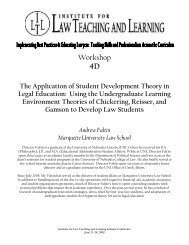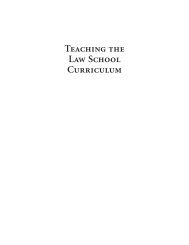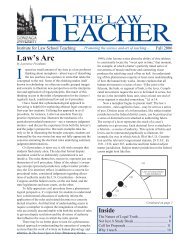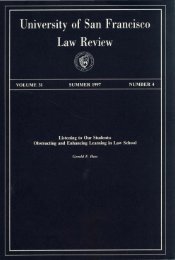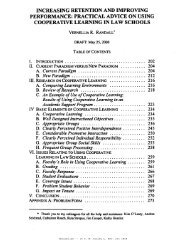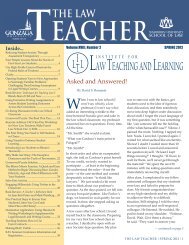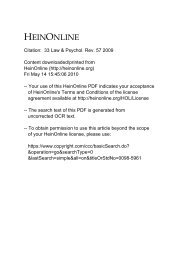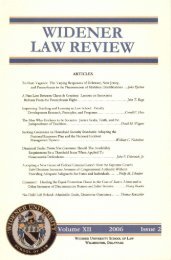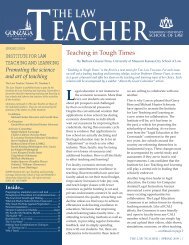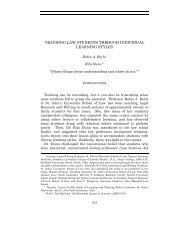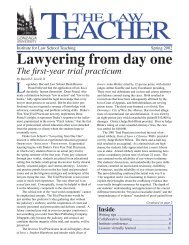The Law Teacher - Institute for Law Teaching and Learning
The Law Teacher - Institute for Law Teaching and Learning
The Law Teacher - Institute for Law Teaching and Learning
You also want an ePaper? Increase the reach of your titles
YUMPU automatically turns print PDFs into web optimized ePapers that Google loves.
‘Trolling’ <strong>for</strong> Participation<br />
By Elizabeth Stillman, Suffolk University <strong>Law</strong> School<br />
In “Harry Potter <strong>and</strong> the Sorcerer’s<br />
Stone” (J.K. rowling 1997), harry,<br />
ron <strong>and</strong> hermoine confront a large<br />
<strong>and</strong> odiferous mountain troll. as a team,<br />
they manage to save<br />
each other <strong>and</strong> knock<br />
the troll unconscious.<br />
<strong>The</strong> chapter ends<br />
by simply stating<br />
that after such an<br />
encounter they were<br />
friends because<br />
the experience was<br />
inherently bonding.<br />
International <strong>and</strong><br />
e.S.L. students (J.D.<br />
as well as LL.M.)<br />
tend to shy away<br />
from classroom<br />
participation. Perhaps they feel that the<br />
american-educated law students share<br />
a community of american legal culture<br />
that they do not. <strong>The</strong>y particularly<br />
fear being called on in class because<br />
it requires quick talking as well as<br />
quick thinking. While I cannot offer<br />
a dramatic bonding experience to my<br />
students as a community building type<br />
of exercise (they don’t even allow pets in<br />
the building, so I imagine trolls are also<br />
<strong>for</strong>bidden) I do try, in my classroom at<br />
least, to provide a safe haven, perhaps<br />
even an incubator, <strong>for</strong> International<br />
students to feel capable of raising their<br />
h<strong>and</strong> to speak in class or be successful<br />
when called on. In particular, I hope that<br />
they will feel com<strong>for</strong>table participating<br />
in class not just with me but the other<br />
doctrinal professors they encounter<br />
as part of their LL.M. experience. In<br />
essence, I am trying to balance this<br />
with helping prepare them <strong>for</strong> U.S. law<br />
school exams, teaching legal analysis <strong>and</strong><br />
writing <strong>and</strong> including enough content to<br />
confer credit <strong>and</strong> a grade each semester.<br />
I have taught the required Introduction<br />
to U.S. <strong>Law</strong> class to our <strong>for</strong>eign LL.M.<br />
students <strong>for</strong> approximately six years.<br />
During that time, the course had evolved<br />
into a miniature version of the first year<br />
legal writing class with a sprinkling of<br />
first year topics included. While this<br />
A large <strong>and</strong> odiferous mountain troll<br />
was (hopefully) a good solid foundation<br />
<strong>for</strong> my non-american LL.M. students in<br />
an american law school, I wasn’t certain<br />
it was meeting my goals because beyond<br />
attendance, h<strong>and</strong>ing in<br />
the written assignments<br />
was the only kind of<br />
participation that was<br />
actually required.<br />
This approach<br />
was not successful<br />
in encouraging<br />
participation in class or<br />
fostering community<br />
within the class, <strong>and</strong> it<br />
did not help students<br />
with these issues<br />
outside of class.<br />
This year, I decided<br />
to try encouraging participation by<br />
changing some of the subject matter in<br />
class to more debate worthy topics. I<br />
determined that my LL.M. students<br />
did not need to learn just a little bit<br />
of every first year class out of the<br />
context of the first year, but rather<br />
would be much more interested in<br />
one time lectures about uniquely<br />
american legal qu<strong>and</strong>aries-like Fourth<br />
amendment search <strong>and</strong> seizure analysis,<br />
constitutional ideas about privacy <strong>and</strong><br />
the Separation of church <strong>and</strong> State.<br />
Yet, scintillating topics alone would not<br />
necessarily energize students to engage<br />
in exciting classroom discussions. I<br />
hypothesized that an exercise in<br />
community bonding would be necessary<br />
to further my goals.<br />
Instead of a troll, I invited the white<br />
elephant in the room-oral participationto<br />
join my class. To help students feel<br />
more com<strong>for</strong>table about speaking up in<br />
class, I had students read a case related<br />
to our long term writing assignment<br />
<strong>for</strong> the first class. We discussed it at<br />
length in the first class <strong>and</strong> then I asked<br />
the students to prepare a two to three<br />
minute oral presentation based on that<br />
case <strong>for</strong> the next class. Specifically, the<br />
assignment asked them to explain their<br />
country’s court system <strong>and</strong> how a court<br />
in their country would determine the<br />
fate of the parties in the case assigned.<br />
This was a graded assignment so<br />
participation was m<strong>and</strong>atory.<br />
It was the most interesting class I<br />
have ever “taught.” I learned about<br />
the concept of “Jurisprudence” in<br />
Mexico whereby judicial opinions<br />
gain precedential authority if they<br />
are followed five consecutive times. I<br />
learned that most western european<br />
countries have much more generous<br />
(<strong>and</strong> regulated) insurance rules. I<br />
learned that the european Union laws<br />
would add another layer to the analysis<br />
in member countries. I learned that<br />
following the rule of law is a luxury we<br />
take <strong>for</strong> granted in the United States <strong>and</strong><br />
other “first world” countries.<br />
My students learned that their<br />
experiences outside this country are<br />
important. My students also learned that<br />
they can st<strong>and</strong> up in a classroom <strong>and</strong><br />
address other students (<strong>and</strong> professors)<br />
<strong>and</strong> that their remarks will be met<br />
with respectful curiosity. My students<br />
learned that they are not alone in feeling<br />
that law school in the United States can<br />
be overwhelming <strong>for</strong> people who are not<br />
acclimated to the U.S. legal culture. we<br />
all learned from each other that day <strong>and</strong>,<br />
most importantly, we learned that we all<br />
have things to learn from one another.<br />
we left class that day, having vanquished<br />
the troll, as a community of learners <strong>and</strong><br />
educators alike.<br />
Using this assignment as the second class<br />
of the semester was also a good practice.<br />
We got to know each other better <strong>and</strong> we<br />
had, luckily, completed the assignment<br />
be<strong>for</strong>e any of the students had actually<br />
been called on in other classes. I plan<br />
to keep this oral presentation in my<br />
syllabus at the same time in the semester<br />
<strong>for</strong> at least the next few semesters to test<br />
if these results will hold true over time.<br />
If not, perhaps I can try the rear loading<br />
dock to bring in the troll.<br />
____________<br />
Elizabeth Stillman is associate professor of<br />
academic support at Suffolk University <strong>Law</strong><br />
School. Contact her at estillman@suffolk.edu.<br />
<strong>The</strong> <strong>Law</strong> <strong>Teacher</strong> | FaLL 2012 | 43



